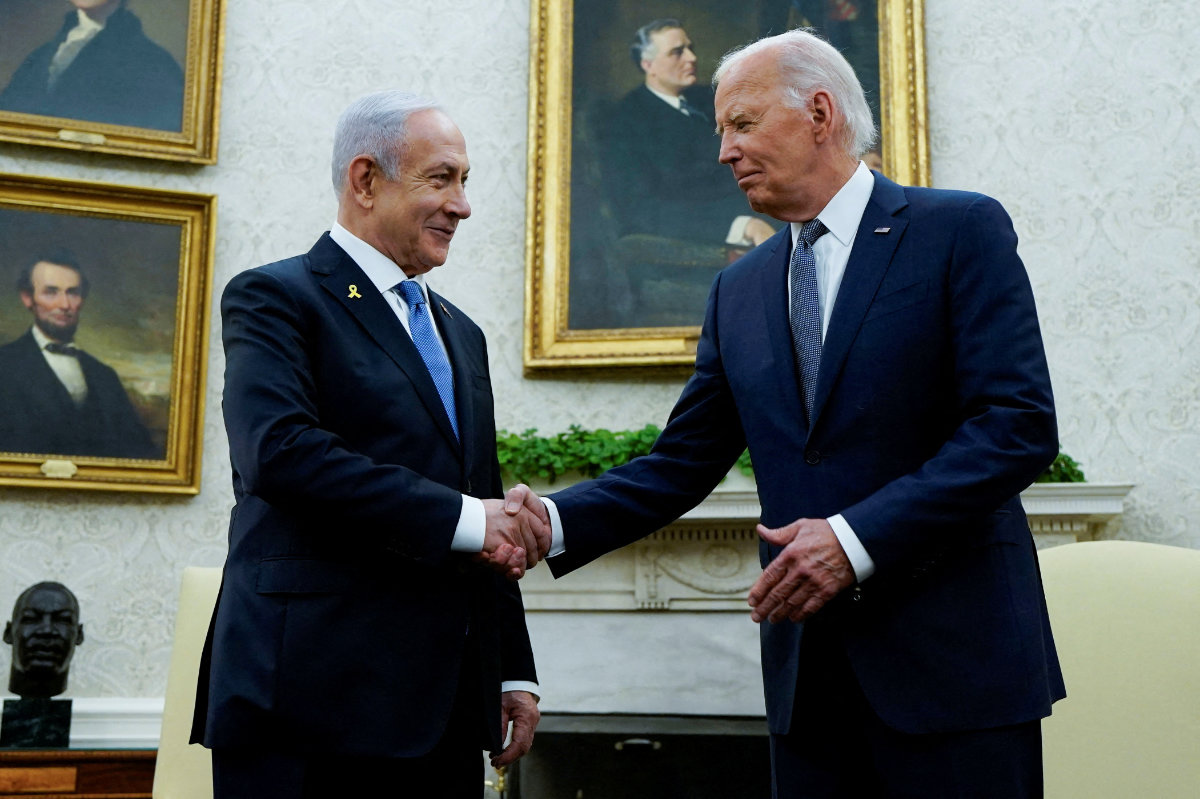BEIRUT: Israeli forces clashed with Hezbollah fighters across Lebanon’s southern border on Wednesday as Israel expanded its invasion force with a fourth division.
The two sides exchanged fire early in the day across the Labouneh area, near the coastal border town of Naqoura.
It followed two days of Israeli attempts to infiltrate the towns of Maroun Al-Ras, Adaisseh and Kfar Kila, which were subsequently abandoned after clashes with the militant group.
Hezbollah said on Wednesday that its fighters “targeted an Israeli infantry unit in Ras Al-Naqoura with a missile barrage.”
A military source told Arab News: “The Israeli advances and retreats along the border can be categorized as an assessment of Hezbollah’s strengths and weaknesses in terms of ground confrontation at the primary defense line.”
The Lebanese border region experienced an unprecedented barrage of airstrikes from Tuesday night through Wednesday.
Towns along the border have effectively become military zones devoid of civilian populations, with Khiam enduring about 15 airstrikes within a span of 30 minutes.
Hezbollah said: “While the Israeli enemy’s forces attempted to advance toward Mays Al-Jabal from several locations, the resistance fighters targeted them at 1:30 p.m. with rocket fire and artillery shells, and the clashes are ongoing.”
Hezbollah said in a previous statement: “At 1:20 p.m., a group confronted the forces of the Israeli enemy as they advanced from the Tufa plain toward Mays Al-Jabal and Muhaybib with a barrage of rockets.”
According to its statements this morning, Hezbollah targeted “an Israeli infantry force that tried to infiltrate the Labouneh area with a large missile barrage, killing and wounding them.”
The Israeli army is focused on entering towns situated in highland areas that provide a vantage point into southern Lebanon.
Its activities near Maroun Al-Ras have been particularly significant, with an Israeli unit entering the town between Monday and Tuesday.
During the operation, Israeli soldiers hoisted their national flag on the wall of a garden at the eastern edge of the town after clearing the area and uprooting trees.
Photographs of the event were taken and shared online before the forces withdrew.
Hezbollah acknowledged the Israeli operation.
UNIFIL spokesman Andrea Tenenti described the situation on the ground as “unsafe and unclear.”
The Israeli army on Tuesday launched a new incursion into Lebanon’s western sector led by the 146th Division, which includes the 2nd Brigade and 205th Brigade.
It aims to “execute a targeted ground operation against Hezbollah’s infrastructure,” and follows eight days of aerial bombardment over Lebanese territory and warnings for residents in southern villages to move north of the Litani River.
In Tebnine, an Israeli drone targeted two motorcycles, as well as a car on the road to the town of Shaqra.
For the first time, Israel struck the town of Wardaniyeh in the Iqlim Al-Kharroub region of Mount Lebanon, targeting an apartment.
The area is housing displaced people from southern Lebanon, mainly those who left the border town of Aitaroun.
The Ministry of Health reported that the attack killed four people and injured 10 others, including the principal of a local school and his wife.
Their children sustained severe injuries.
Cautious calm prevailed in Beirut’s southern suburb following a series of raids on Tuesday night that targeted several areas in Laylaki, Haret Hreik and Burj Al-Barajneh.
The attacks were preceded by a warning from Israeli army spokesperson Avichay Adraee, who instructed residents of the targeted areas to leave.
The southern suburb has become a ghost town, with unprecedented destruction visible near neighborhood landmarks, as well as flames rising from the rubble of flattened buildings.
A line of four residential buildings in Burj Al-Barajneh collapsed following the most recent Israeli strikes, and Israeli jets have circled over the area round the clock.
In a statement, the Israeli army claimed that its attacks “targeted a weapon factory and Hezbollah’s intelligence headquarters in Beirut’s southern suburb.”
Saaideh in western Baalbek was also hit by an airstrike, killing a citizen later identified as Hussein Saleh Amhaz and injuring several residents, including three women from the same family — a grandmother, her daughter and her granddaughter.
An Israeli raid also targeted a house in Al-Hallanieh, killing two people and injuring others.
Hezbollah operations targeted Israeli military positions and settlements on and across the border.
Israeli media said that the militant group launched 20 missiles at Kiryat Shmona, killing two people.
Hezbollah said that it targeted “a gathering of the Israeli enemy in the Kiryat Shmona settlement with a rocket salvo.”
Amid Israel’s invasion, Lebanese Prime Minister Najib Mikati said that Arab and international efforts to end Israel’s “aggression” are “ongoing.”
He added: “However, the Israeli intransigence and the efforts by the enemy to achieve what it considers as gains and victories are still obstructing the success of these efforts.
“Lebanon’s friends from the Arab and foreign countries also continue to pressure Israel into implementing a ceasefire for a specified period in order to discuss the main political steps, most importantly implementing Resolution 1701 fully, and compelling the Israeli enemy to implement it.”
Hezbollah repels Israeli incursions as deadly clashes continue
https://arab.news/yzmap
Hezbollah repels Israeli incursions as deadly clashes continue

- The two sides exchanged fire early in the day across the Labouneh area, near the coastal border town of Naqoura
- The Lebanese border region experienced an unprecedented barrage of airstrikes from Tuesday night through Wednesday





























